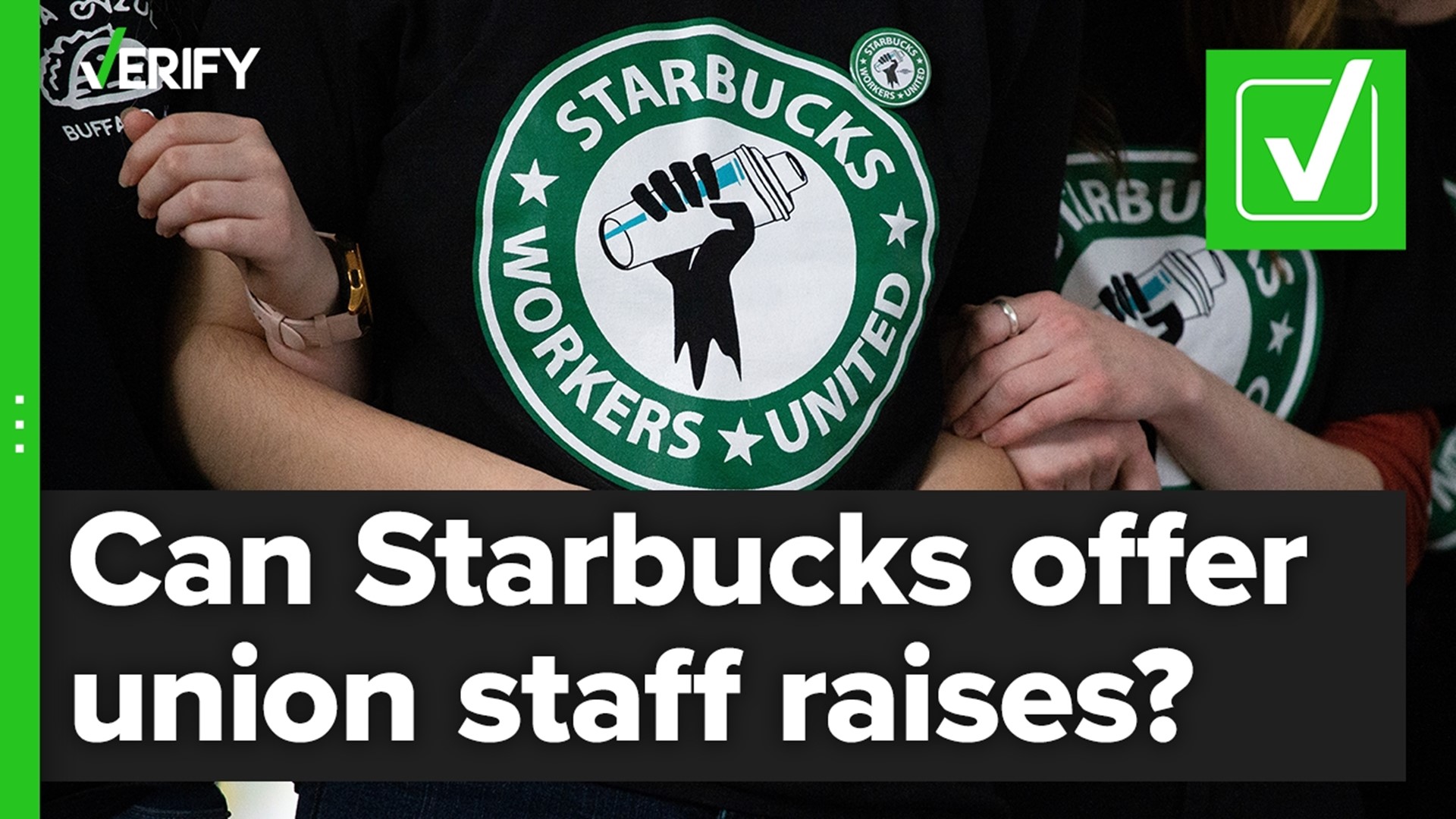As a growing number of Starbucks stores are becoming unionized, labor activists are accusing the company of taking new measures to discourage organizing. Starbucks says it's just following the law.
In a call with shareholders, CEO Howard Schultz announced the company would be offering hundreds of millions of dollars worth of new benefits, including raises, to its employees. But he said those benefits won’t be available to workers who are in unions or are in the process of unionizing.
An article on the company website reads “Starbucks lacks the right to unilaterally make these changes [at] stores where there is a union or union organizing.”
Starbucks Workers United filed a complaint with the National Labor Relations Board, saying these statements are intended to stop unionizing efforts.
In a statement to VERIFY, SWU said in part, “Starbucks is permitted by law to offer these benefits to workers at unionized stores. Our bargaining committees will demand that these modest improvements be given immediately to all partners.” Partners are what Starbucks calls employees.
THE QUESTION
Does labor law allow Starbucks to offer raises and new benefits to its unionized workers?
THE SOURCES
- National Labor Relations Act
- National Labor Relations Board
- Matthew Bodie, Professor of Law at Saint Louis University
THE ANSWER
Yes, labor law allows Starbucks to offer raises and new benefits to its unionized workers. It does, however, prevent them from implementing the raises and benefits without getting union approval first.
WHAT WE FOUND
The National Labor Relations Act is the primary law governing what’s legal and not legal when it comes to unions.
The pertinent section for this case is §158(d), which says there is a “mutual obligation of the employer and the representative of the employees to meet at reasonable times and confer in good faith with respect to wages, hours, and other terms and conditions of employment.”
The National Labor Relations Board, in charge of enforcing these laws, expands on what exactly that means on its website, saying employers cannot “make changes in wages, hours, working conditions, or other mandatory subjects of bargaining before negotiating with the union.”
So it’s true that the company could not just start giving new benefits directly to their unionized workers without first bargaining with the union. But there’s nothing that says they’re prohibited from making that offer to the union.
“The only requirement is that they would go to the union and say, ‘Okay, we want to bargain with you. We're raising everyone else's at these non-union-represented locations; can we do it at your store right now?’” said Matthew Bodie, a law professor who has experience in labor law, including as an attorney for the NLRB. “[Schultz] is correct in saying that the company cannot change the terms and conditions unilaterally. But he's incorrect to say that, therefore, we can't propose these benefits and wage increases to the union that's representing these other workers, and see what they say.”
The union alleged that by making the offer exclusively to non-union workers, Starbucks is threatening employees who might wish to organize.
“Starbucks continues to knowingly misrepresent U.S. labor law in a sad attempt to slow our organizing campaign and disregard the will and rights of its workers,” read a statement from Michelle Eisen, a union leader who works as a barista in Buffalo.
Bodie said that argument may have legal merit.
“To say that we're not going to give the unionized workers the same that we're willing to give to other workers, that seems to me pretty clearly, not only a threat to punish the workers, but also bargaining in bad faith,” said Bodie. “It’s… an unfair labor practice to say, ‘The union is not going to be able to negotiate as good a deal as we're giving to these other employees.’”
Starbucks sent VERIFY a statement identical to the one on its website, which also says that in union stores “Starbucks will provide wage increases that were announced in October 2021 and will otherwise comply with all applicable legal requirements.”
When asked directly if the company’s position is that it cannot even make an offer of increased wages or new benefits to unionized workers, and asked whether such an offer has or may be extended, a spokesperson declined to elaborate beyond the company’s previous public statements.












